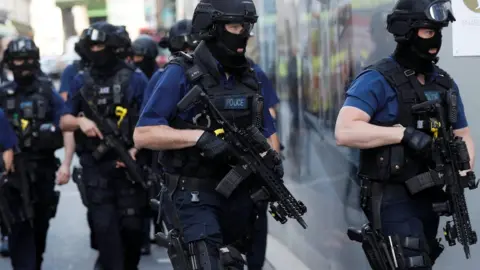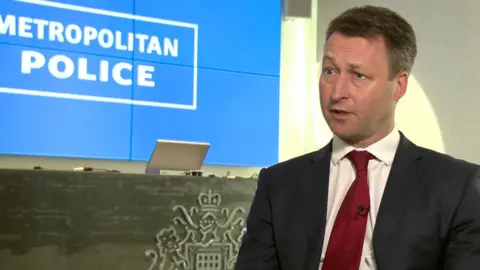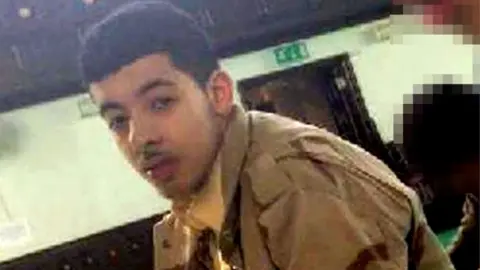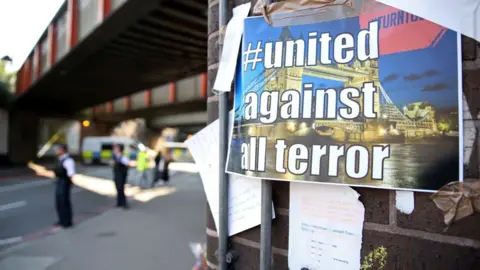A demanding few months, says Met anti-terror chief
 Reuters
ReutersThe head of the Met Police's Counter Terrorism Command rarely gives interviews but ahead of a special programme from New Scotland Yard on Tuesday, Dean Haydon spoke to the BBC Asian Network about the challenges the force faces.
Cdr Dean Haydon agrees the last few months have been "demanding" and "challenging".
Since he started the job in December 2015, there have been four separate terror attacks - at Westminster Bridge, Manchester Arena, London Bridge and Finsbury Park Mosque.
"If you were talking to me 12 months ago, I'd be talking about a different terrorist threat - the threat's shifted, it's changed," he says.
But Cdr Haydon says the public are not aware of the plots that have been stopped during the same period.
"Six were disrupted, and over the last three years, 19 different terrorist plots have been stopped," he explains.
Before Westminster, the highest-profile terror attacks in the UK in recent years were the murder of MP Jo Cox in June 2016 and soldier Lee Rigby in Woolwich in May 2013.
For Cdr Haydon, the difficulty facing police now is individuals who have been acting alone and using everyday items such as knives and cars.
"Twelve months ago the plots we were preventing were those aimed at the police, the military and government officials.
"But the recent attacks were on the public, the community. They're indiscriminate."
'Record number of calls'
Cdr Haydon says the job of monitoring and disrupting plots is an around the clock task and a lot of the work relies on information provided by the public.
"I would class these attackers as lone actors," he says.

"It's difficult to identify, disrupt and prevent these individuals [so] we do need the help of the public, because the police and security service can't do this alone."
The public, and especially Muslims, have been urged to be more vigilant and proactive in reporting suspicious individuals.
But recently it emerged that members of that community had reported Manchester suicide bomber Salman Abedi and Khuram Butt, one of the men behind the London Bridge attack, to the police through its anti-terror hotline.
Asked why the authorities did not act on the information, Cdr Haydon insists every call is treated seriously.
"This year we've had the highest amounts of calls we've ever seen. Every one we get is prioritised.
"Some of the information goes into wider intelligence picture and some is based on live operations we're running. If you phone us anonymously, obviously we can't call you back. If you've left your contact details, and we think it's safe to call you back, we will."
Last year a record number of people contacted the confidential hotline, with the service receiving more than 22,000 calls.
About a third of these calls feed the police's operations.

But when people report suspicious behaviour, or suspect someone has been radicalised and wants to go abroad to fight, what happens next?
"We have a duty of care to protect individuals regardless.," says Cdr Haydon.
"We'll do everything to stop them going. We'll take their passports off them. There are various systems at airports and ports across the country to identify individuals. But I'm glad to see there's a slowing down of people going abroad and that's thanks to the work we've done."
He says 850 people have left the UK to join terrorist organisations. Some have been killed in war zones, some have stayed overseas but others have returned. It's the latter that "cause [him] concern".
"Some of them have had military training abroad and been radicalised. We are contingency planning now in relation to all of them. We've got a fair idea of who every individual is."
Many would ask, why let them back? Why trust them?
Cdr Haydon emphasises that it is his job to protect all Britons and if there's evidence of terrorist activity, individuals will be arrested and prosecuted.
But he says the police has a duty to protect the young and vulnerable.
"We work with local authorities, some of them are statutory partners, some of them are intervention providers, trusted members of the community who work alongside us and ultimately safeguard and protect young people."
'Not just about Muslim community'
One of the key ways in which his force and the government are attempting to safeguard is through its anti-terrorism strategy Contest. Yet the part of it that has caused much controversy is Prevent.
Former Met Ch Supt Dal Babu - one of Britain's most senior Muslim officers - called it "toxic". He said many Muslims do not trust it and see it as a form of spying.
But Cdr Haydon says those who criticise it are not offering another solution.
 Getty Images
Getty Images"I hear criticism but I absolutely don't accept it," he says. "Prevent is not about spying on communities. It's about safeguarding."
Safeguarding is something Cdr Haydon mentions several times.
Having previously headed the Child Abuse and Sexual Offences arm of the police and enforced safeguarding systems there, he sees Prevent as its equivalent in the terrorism world.
Nevertheless doesn't the criticism of Prevent affect him, especially as it comes from the people he needs to help him do his job effectively?
"I hear that, but sometimes it's based on ignorance and sometimes it comes from sections of the community that just don't want it to work."
One thing that is striking about the conversation with Cdr Haydon is that he rarely mentions the word Muslim, preferring to use words "community" or "communities".
But he does stress that he wants to reassure those who feel unfairly under suspicion.
"Prevent is not just about the Muslim community. It goes across all communities."
He said a third of the cases related to domestic extremism and involved tackling the threat from right-wing extremists.
"I have seen the positive work of Prevent," he said, adding it had stopped people from being radicalised or going abroad.
"It's a fantastic tool and it's here to stay."
Listen to The Big Debate, Live at The Met Police on the BBC Asian Network on Tuesday 8 August at 10:00 BST
